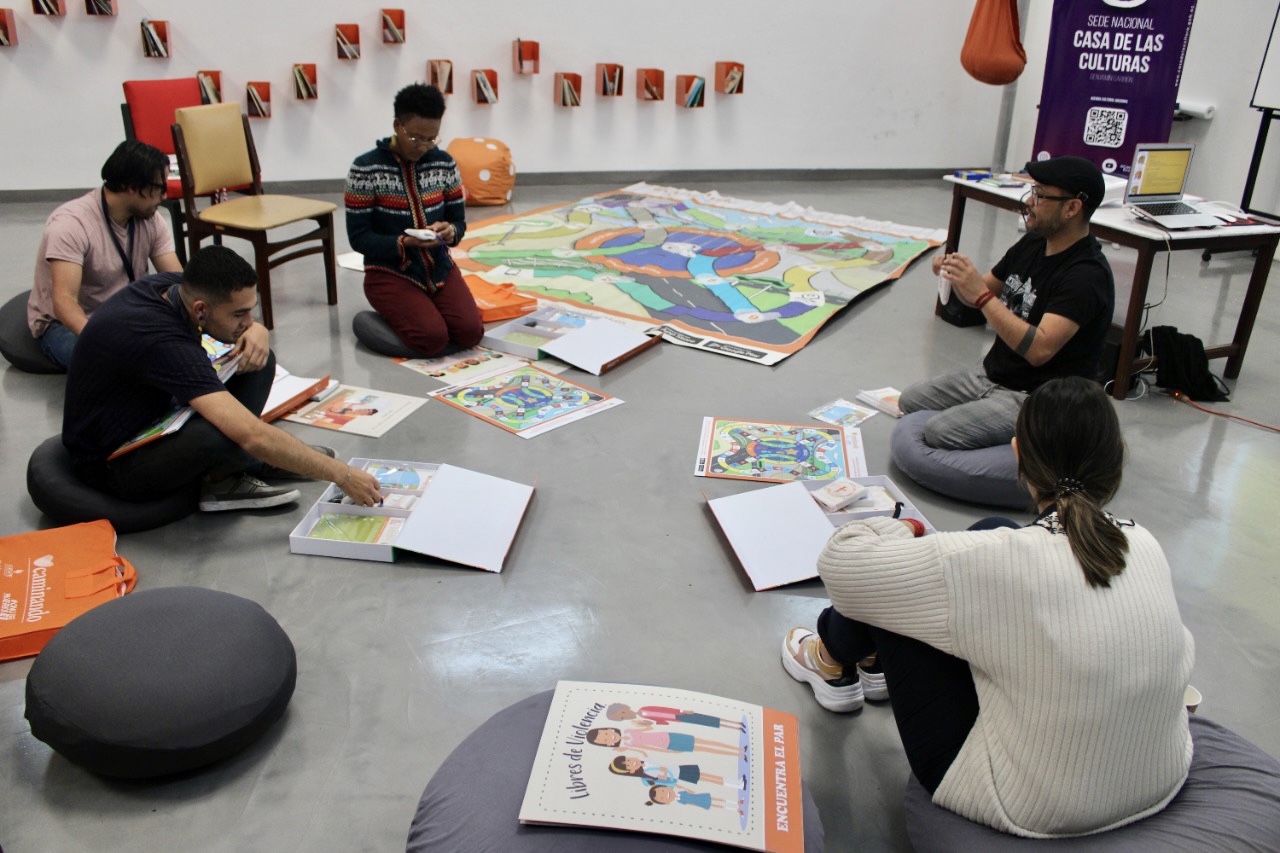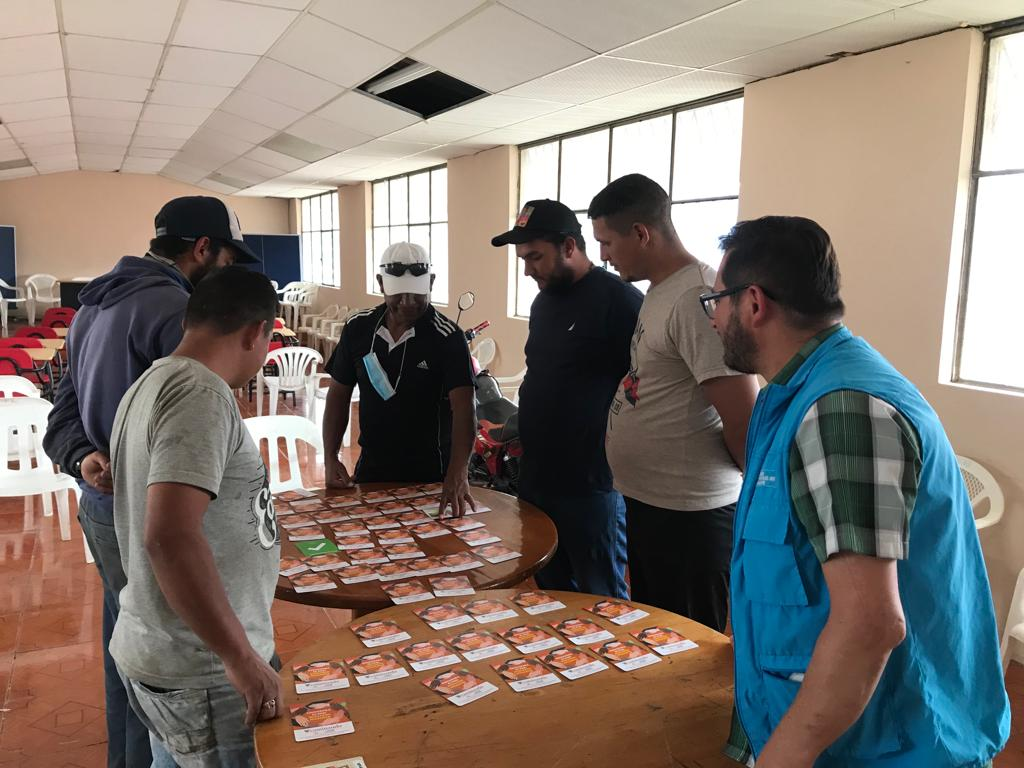Masculinities in Movement: Ecuador advances towards equality and co-responsibility
Date:
Different initiatives are being developed worldwide to ensure that families are safe spaces where all forms of gender-based violence are eliminated and the stereotypes built around the sexual division of labor are transformed. In addition, promoting co-responsibility in care and unpaid work in the home, which to date rests mainly on the shoulders of women.
Many of these initiatives recognize the role of men as allies in eradicating violence against women and achieving full gender equality based on an approach which goes beyond and promotes masculinities that embrace care, solidarity, empathy, and respect in all social ties. In Ecuador, UN Women together with the Coordinadora de Medios Comunitarios Populares y Educativos del Ecuador (CORAPE), through the Masculinidades en Movimiento initiative, promotes the transformation of social imaginaries around traditional masculinity towards new co-responsible and non-violent masculinities.
Breaking paradigms to become allies for gender equality

The construction of new non-violent masculinities promoted in the framework of the Caminando project has been carried out through face-to-face and virtual trainings in which more than 800 migrant, refugee, and host community men in the northern border of the country have received conceptual and didactic tools developed to question stereotypical masculine patterns and explore alternative ways of expressing masculinity.
Jhon Walter is one of 800 men trained in UN Women's strategy to prevent gender-based violence (GBV) and achieve equality.
His training as an educator and his interest and passion for the defense of human rights prompted him to be part of the first group of participants in this initiative and to become a replicator and trainer on gender and masculinities. In this way, he can share all his knowledge and commitment with more women, men, and families.
Being part of this process has allowed him to identify different attitudes in his day-to-day life that he was unaware of. "Now I am more aware of different practices, and I realized that it should not be like this, that many of these practices are violent and now I am more respectful," says Jhon Walter.
Co-responsibility for care tasks in the home allows women to develop personally and professionally, promoting equality and social transformations. In this way, the view of new masculinities will enable men to take on tasks of caring for children, the elderly, or people with disabilities, breaking down gender stereotypes that kept them away from these practices and subjected them to patterns of silence and deprivation of tenderness, affection, and care.
In the face of this, Walter emphasizes the importance of men being able to assume the roles that have been traditionally assigned to women, not only in the home but also in their daily lives.
"The new masculinities we must assume them from the gender approach and rights approach, nothing is gained if one does all these activities at home if I continue to violate my partner and my children, the change must be in all areas," says Walter.
"Masculinities in Movement" works from a playful and close perspective in which men play while rethinking the concepts of traditional masculinity that limited them, in all areas, especially in the family.
"In families, both men and women have responsibilities. It is a joint work. We must all assume the change from our families, in the construction of love and respect", emphasizes Jhon Walter.
The challenge of creating new masculinities
Transforming masculinities requires individual and collective effort. The expert and feminist activist Rita Segato says that "masculinity is a mandate that requires men to constantly put their attributes to the test: war power, sexual power and economic power - the masculinity mandate is a mandate of violence, of domination." The pact around this mandate subjugates men from childhood. It makes, for example, that expressions of sensitivity or "femininity" in children are socially and morally sanctioned, so it requires commitment and determination to break it.
Edison Porras, the coordinator of the "Masculinities in Movement" project, indicates that being part of this project has also meant a great experience in his professional and personal life since during the workshops he learned about the transformations of the participants, mainly in their families.
"Currently, we are gathering information to know in depth the changes in attitudes, especially in actions related to the co-responsibility of household chores within the family and care of children, their ways of relating and how they assume these new attitudes," says Porras.
For Edison, it is gratifying to witness these transformations. "Many participants say that they have a better relationship with their children, that their relationships with their partners have improved, and that they have also taken on domestic chores based on the principle of shared responsibility," the coordinator says.
For Edison, men have an essential role in advancing gender equality. "It is up to us (men) to review, question, and propose actions that allow us to discuss co-responsibility in care and domestic work in the home. We must position ourselves in the face of this urgent need to participate in these tasks," he warns.
Jhon Walter is currently replicating these training processes in his work environment. For him, starting to train men in new masculinities is the call's main challenge. "The first workshop I conducted was designed for 22 people, but only three men attended. This did not discourage him from continuing with the training processes. Little by little, more men called others to participate, thus reaffirming the idea that men can be allies in preventing gender-based violence.

Both Jhon and Edison agree that the success of this initiative is reflected in the fact that more participants want to become replicators in their communities; the possibility of transforming their lives and those of their families and communities is presented as an act of responsibility and freedom.
"We have met many of the companions who shared the game with their families, mainly with their children, and today they want to be community managers to prevent violence not only in their homes but also in their communities," Edison points out optimistically.
Breaking the pact of violent masculinity invites men to be part of a transformative process that builds environments free of gender-based violence, safe communities and families for women and girls, and societies free of stereotypes and systems of discrimination and inequality.